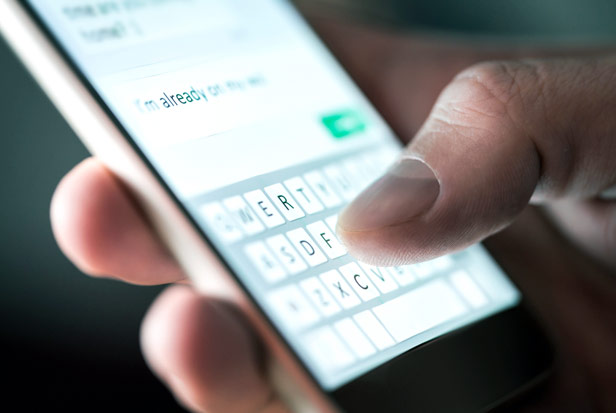February 19, 2021
How to Market Effectively With Text Messages
It just makes sense to meet people where they are – on their phones. SMS marketing can be incredibly powerful; just be careful not to abuse the medium.
Last month, email automation service Mailchimp acquired Chatitive, a marketing platform that helps businesses communicate with clients via text messaging.

“It’s more important than ever for small businesses to reach their customers where they are, and mobile messaging is an incredibly effective way to do just that,” Mailchimp wrote in a statement. The company added that texts are a great solution for businesses that need to “share time-sensitive information, like transactional and promotional messaging, and build lasting relationships with their customers.”
Indeed, marketing via text message can be incredibly effective. Consider these stats from Hafta Have, a company that provides online tools for retailers: 98% of adults age 30 to 49 use texts, and 66% of millennials say they prefer text messaging over email. Text messages also have a remarkably robust open rate – 99%, compared to email marketing’s lackluster 19% average. “It’s just where everybody is communicating,” says Amanda Latifi, co-founder of Hafta Have. “It’s a very intimate communication channel.”
Hafta Have has partnered with retailers including Starbucks, Chilli Beans and Kittenish to use custom text message campaigns to increase engagement and sales in brick-and-mortar and online stores. With Starbucks, for example, Hafta Have tested a promotion in a Las Vegas location to drive upselling of select store merch. Signage depicting a barcode was placed next to one of the store’s travel mugs. Shoppers who took a picture of the barcode and texted it to a specific number would then unlock an offer for a free tall coffee with a purchase of the mug. A quarter of the shoppers who texted the barcode ended up buying the mug, and the store was able to increase its average check size by two times during the four-week test period, according to Latifi.
Hafta Have has also used text messages to help retailers solve the “abandoned cart” syndrome in online shopping. The technology can monitor products being added to a cart, and if the purchase isn’t completed, send out a product-specific text message giving customers added incentive to buy, perhaps with an offer of free shipping on the purchase.
Brands using text messages in their marketing strategy have seen some impressive returns, but the personalized nature of texting that makes it such a powerful tool also means marketers must tread carefully to avoid raising the ire of the very consumers they’re trying to reach.
Consider these tips for ensuring your text message marketing is effective, inoffensive and even welcomed by the recipient.
1. Have recipients opt in. “A lot of people say that SMS is the wild, wild West,” Latifi says. But there are rules governing when you can send a marketing text. In particular, marketers need to have a “timestamp of consent” before sending out a message. By skipping this step, you’re more likely to irritate the recipient, but you also open yourself up to potential legal trouble. Have customers opt in to receiving texts when they sign up for your email list, make a purchase or by having them text a keyword to a short code, says Shaun Price, head of customer acquisition at MitoQ, a dietary supplement company.
2. Be intentional when you craft your message. Marketers run the risk of making the same mistakes with SMS that they did with email, Latifi says. Text messages should not be used as a megaphone or for what Latifi calls “spaghetti-wall messaging.” Share information about a great, time-sensitive discount (but don’t spam them with “sale” messages) or relay timely information that the recipient cares about.
3. Keep it real – and respond promptly. As previously mentioned, texting is an intimate communication method. Make sure your marketing message sounds real, not robotic, even if you’re using automation tools for convenience. Personalize the message whenever possible. “Use colloquial language that aligns with your brand,” Price says. “You want your SMS marketing to feel as much like talking to a friend as possible.” Consider using an auto-responder so you can answer customers in real-time and spark a conversation, he adds.
4. Use graphics to make your message stand out. A picture is worth a thousand words. Given the brevity inherent to the medium, why not add some pertinent visuals to your text to ensure your message carries extra weight?
5. Choose the right time to send. With COVID disrupting many people’s typical schedules, advice about when to send marketing messages has gone out the window (though it’s always a good idea to ensure your time zones are accurate and you’re not sending messages in the middle of the night). “You have to figure out what works best for you as a brand,” Latifi says. “It’s a crapshoot right now.” She recommends using a/b testing – just as you would with an email campaign – to narrow down optimal timing.
6. Include a call to action. “Make sure you give customers something to do with the text,” Latifi says. “Don’t just tell them something. Give them the next step.” That means ensuring there’s an active link in the message and a crystal-clear path to what you want the recipient to do or see next.